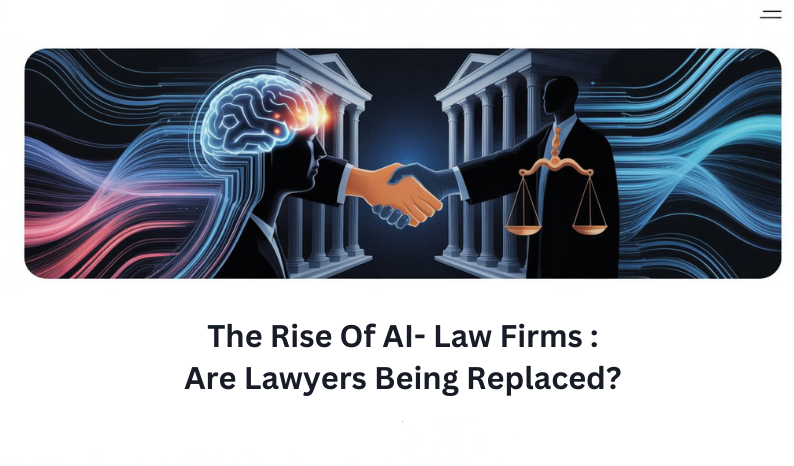The legal profession, once rooted in tradition and precedent, is undergoing a profound shift. With Artificial Intelligence (AI) advancing rapidly, the concept of AI-first law firms is no longer theoretical. These firms place AI at the center of their operations, using automation, analytics, and machine learning to transform how legal services are delivered.
But the central question remains: Are lawyers being replaced, or simply redefined?
What Are AI-First Law Firms?
An AI-first law firm integrates artificial intelligence into nearly every stage of legal work. Instead of acting as a supporting tool, AI drives the core of its workflows.
This includes:
- Contract Analysis: AI reviews thousands of documents in seconds, flagging risks and inconsistencies.
- Predictive Analytics: Algorithms forecast case outcomes based on historical data.
- Legal Research: Tools like Casetext, Harvey AI, and Lex Machina replace manual research.
- Client Interaction: Chatbots handle basic queries and onboarding, offering 24/7 support.
- Billing Automation: AI systems streamline invoicing and track time automatically.
In this model, humans and AI collaborate, with lawyers focusing on strategy, advocacy, and negotiation, while machines handle repetitive tasks.
Why Are AI-First Law Firms Emerging?
Several factors drive the rise of AI-first law firms:
- Several factors drive the rise of AI-first law firms:
- Client demand for faster, more affordable services.
- Competitive pressure from tech-driven firms.
- Growth of big data requiring automation.
- Globalization that demands scalable systems.
Benefits of AI-First Law Firms
AI-driven firms provide:
- Efficiency in discovery and due diligence.
- Higher accuracy and fewer errors.
- Lower costs, improving accessibility.
- Scalable operations without additional staff.
- Faster service and transparency for clients.
Are Lawyers Being Replaced?
One of the biggest fears about AI-first law firms is the replacement of lawyers by machines. While some routine roles may decline, AI is unlikely to fully replace lawyers. Instead:
- Junior Lawyers at Risk: Entry-level tasks like document review are increasingly automated.
- Lawyers as Strategists: Attorneys will focus on negotiation, advocacy, and client counseling.
- New Roles Emerging: Positions such as “Legal Data Scientist” and “AI Compliance Officer” are growing.
The reality is that AI will reshape the profession rather than eliminate it. Lawyers who embrace AI will thrive, while those resistant to change may struggle.
Challenges of AI-First Law Firms
Despite the benefits, AI-first law firms face hurdles:
- Ethical Concerns: Can a client trust an AI-generated legal opinion?
- Bias in Algorithms: If trained on biased data, AI could produce unfair results.
- Data Privacy: Sensitive client information must be secured.
- Regulatory Uncertainty: Laws around AI in legal practice remain unclear.
- Job Displacement: The automation of routine work may reduce demand for junior associates.
Balancing innovation with responsibility will determine the success of AI-first firms.
Case Studies: AI-First Practices in Action
- DoNotPay: Marketed as the world’s first “robot lawyer,” it helps clients contest parking tickets and handle small disputes.
- Atrium (now defunct): Once a venture-backed startup, Atrium used AI for contract review but struggled with adoption, showing challenges of scaling.
- BigLaw Firms: Global firms like Clifford Chance and Allen & Overy are heavily investing in AI for research and client services.
These examples show that AI-first law firms are not only possible but already emerging.
The Future of Lawyers in AI-First Firms
As AI adoption grows, lawyers will need to adapt:
- Tech Literacy: Lawyers must understand how AI tools function.
- Interdisciplinary Skills: Blending law with data science and analytics.
- Focus on Judgment: Human empathy, negotiation, and persuasion remain irreplaceable.
- Ethical Leadership: Lawyers must oversee AI responsibly, ensuring transparency and fairness.
Conclusion
The legal industry is at a turning point. AI-first law firms are proving that technology can transform efficiency, cost, and client service. While fears of replacement persist, the reality is that lawyers will not vanish—they will evolve. By embracing AI, lawyers can shift from repetitive tasks to higher-value roles focused on strategy, judgment, and ethics.
The rise of AI-first law firms signals not the end of lawyers, but the beginning of a new era of legal practice where humans and machines collaborate to deliver better justice.



